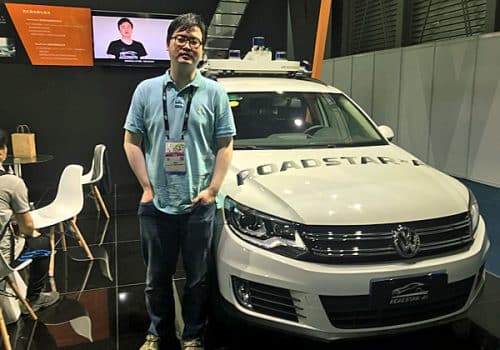The autonomous vehicle industry is among the most talked about areas in the world of technology - but only in the context of new cars ● A Chinese company is interested in doing this in existing vehicles

Xianchao Tong, CEO and co-founder of Roadstar AI, next to a vehicle with the company's technology at the CES Asia conference. Photo: Avi Blizovsky
The level of autonomy of vehicles is divided into five, starting with level 1 - driving aids and ending with level 5 - a car that can drive itself in any situation. Most of the testing of these cars is level 2, meaning that driver intervention is still required in an emergency and we have seen what happened when drivers were not alert. At level 4, the human factor is no longer consumed at all and the cars drive by themselves, without any help, including in busy cities, but not yet in quite complex areas like the big cities of India.
There is a Chinese startup called Roadstar AI, which wants to jump to level 4, that is - a level where the intervention of a driver will not be required, including in busy cities. I met the CEO and co-founder of the company, Xianchao Tong, at the CES Asia conference, held recently in China.
Roadstar AI does not offer its own car, but claims to make existing cars autonomous. It offers a multi-sensor device on the roof of the car and a connection to the vehicle's computer, as well as a fusion of the information from all these sensors. The device, Car top box, combines hardware and software, and contains many types of sensors, including optical sensors (cameras), lidar and radar, to cover all possible visibility conditions. "For the fusion of the sensors, we use artificial intelligence, deep learning, machine learning and robotics. We integrate lidar and radar in autonomous cars to achieve better performance in the aspect of comfort, safety and driving efficiency", Tong explained.
One of the main places where Roadstar AI conducts its experiments is Shenzhen, among the most densely populated areas in China. According to him, the company chose Shenzhen because "an intersection in China can accommodate hundreds of cars and hundreds of pedestrians at the same time. Some people don't follow the rules, for example crossing on red lights, the streets are narrow and many drive aggressively. Even in China, the cars have to give the right of way, but already after a week of testing we realized that the pedestrians should take the right of way, the drivers don't give it that much. Maybe the autonomous cars will give it."
Experiments - also in the mountains
Shenzhen is a flat city and the company wanted to conduct experiments also in places that are not like that - but still busy. They chose San Francisco for this purpose. "The experiment there showed that our technology can work well even in cities with mountainous topography," noted Tong.
Another testing ground for Roadstar AI was Tokyo, among the most densely populated cities in the world, but in the Japanese capital the company tried an autonomous bus. "Precisely on the bus, the technology can be simpler, because these are fixed lines and the system can learn them well," Tong said. "But on the other hand, the safety requirements in them are higher. We put between 20 and 30 people on each trip, after they were convinced that the bus was safe, even though it was driverless. In general, people will have to adapt and accept the new technologies. there's no way back".
What about cities like New Delhi and Mumbai, where the traffic is chaotic?
"India is a difficult country in terms of transportation and we want to solve the problem in China first. Therefore, we are turning to the Chinese market, although we also have projects in the United States, Europe and Japan."
How did the idea come up to develop a device that would make every car autonomous?
"In 2009 I moved to the United States and studied for a doctorate at Virginia Tech. My research was about location, localization and mapping. After I graduated, I moved to California and worked first at Nvidia, then moved to Baidu's development center in Silicon Valley. Then I returned to China to start the company.
The idea was born from years of experience. Throughout my work in the different companies I have seen different solutions. I met a co-founder of Baidu and suggested that he establish a division within the company that would develop the product, but the decision-making process in large companies is slow, so I went out and founded Roadstar AI."
Do you have a connection with the automotive technology industry in Israel?
"We are open to cooperation. I know that there are good technology companies in Israel and we recently contacted Inwise to integrate their lidar systems into the experiments, but we have not yet received the sample that can be installed."
